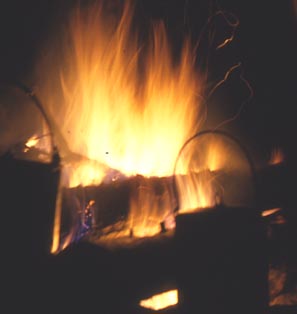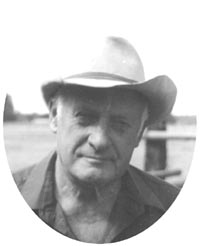to visit Roland's newspaper columns and weblog archives
a weblog sharing info on outdoor skills and campfire musing by a guy who spends a bunch of time in pursuit of both
CULTURE
WHERE -
TALES ARE TOLD OF
Welcome to Roland Cheek's Weblog
Roland is a gifted writer with a knack for clarifying reality. Looking forward to more of his wisdom
- Carl Hanner e-mail
Jane and I produce this Campfire Culture Weblog because we wish to do so, not because it fattens our Swiss bank accounts. Traditionally, we've taken payment in letters, phone calls, and emails worth their weight in gold, thanking us for writing poignantly about subjects dear to the contributor's heart. Many correspondents say they feel that they know us through our columns, books, or radio programs. While there might not be many physical calories in those kinds of contacts, there are certainly a bunch of psychic ones. Hopefully you will respond at the bottom of any weblog that pushes your hot button -- pro or con, it makes no difference.
To access Roland's weblog and column archives
Tip o' the Day
"Check fish hooks. Do they need a touch of emery cloth or honing stone? Does your creel need a clean out? Perhaps a water and brush job inside?"
Knowing what outfitters' cooks do to prepare for a busy summer and fall would be of interest to Campfire Culture readers, I asked Jane to make a list of spring chores. I think it significant the above items were first on her list. Other suggestion:
Clean ice chests with soap and water or a mild bleach and water solution. Rinse. Use water and baking soda for more stubborn odors, or a vanilla solution for those most stubborn. Smells good! Important! Don't close the lid while wet.
How about your campstove? Splattered grease, boiled-over coffee grounds, even a fried potato slice or hotcake batter droplets have been known to lurk amid the darkest recesses of a Coleman prior to cleaning. Much better and easier to clean before heading off to the big lonesome. She says to wipe out with paper towels, then use brush with soap, water, and degreaser if needed. While you're at the stove, check its generator. Take an extra along just in case.
Screw on saltshaker lid with wax paper between lid and shaker holes to keep out moisture and keep in salt. Put in a pinch of cornstarch or a few grains of rice to keep holes from clogging when the air is damp.
Go through your outdoor "kitchen" using a checklist to insure that each untensil, plate, cup, glass, cookware, etc. is in place and in good repair. Replace when necessary.
Jane is careful about her camp facilities, too. She checks her dining fly and each lightweight summer tent to see there are sufficient stakes and aluminum poles. If grommets are missing, she kicks them back to me for replacements.
Her kitchen boxes -- the packboxes used for carrying groceries and kitchenware -- must be in good repair, with easy sliding doors and storage shelves in place and well set.
Other items of interest to her include a small collapsible trenching shovel for handling coals on her Dutch ovens, a whisk broom for sweeping out summer sleeping tents, a cooking grate (we use a collapsible quad-pod -- no fire ring necessary), and folding canvas water buckets. All items must be in good repair. Their carrying cases, too.
Jane takes a lot of aluminum foil: to cover pans used for open fire cooking; for baking potatoes; even for making a gas lantern directional (she presses foil against the globe's inside surface).
And last but not least, she inventories our outdoors library -- the books we take with us into the backcountry: mushroom guide, wildflower identification, guide to birdwatching. Several that are especially suitable: The Savory Wild Mushroom - by McKenny and Stuntz; A Field Guide to Rocky Mountain Wildflowers - by Craighead, Craighead and Davis; A Field Guide to Western Birds - Peterson
Chocolate Legs: Sweet Mother, Savage Killer
WHAT'S THE BIG DEAL ABOUT EARTH DAY?
Today is "Earth Day," and it's big to lots of folks--as well it should since the earth is about the biggest touchy-feely thing with which any of us will ever be associated. On a local level kids will ferret out accumulated roadside debris that insufferable pigs have discarded through auto windows during the previous year. We'll hear a lot about recycling--a drumbeat roll that, once we develop both will and mechanics, may save us from fouling our own nests.
Earth Day, 2009 will see conservation documentaries trotted out and dusted off and sensationalized. Nationally, politicians will posture and students will demonstrate for protection of our environment. The news media will report both posturing and demonstrations with a straight face and Americans will listen and watch and read about it with a modicum of bored interest. It's inescable that we'll all be forced to become aware of our environment for that one day.
Then we'll go back to doing things the way we always have. We'll throw orange peels and empty beer cans and disposable diapers out car windows, pollute telephone poles and barn walls with election posters, spew raw sewage into rivers, dump slag heaps upon hillsides, slash and burn forests, and poison land in order to "save" it.
As you may have already guessed, I don't see what's the big deal about Earth Day. Sure, by naming it and currying it and cuddling it, the name Earth Day has a certain nuisance value whereby the public's collective conscience can be piqued, and disgraceful polluters can be tweaked. But to my way of thinking, making a big deal about Mother Earth one day each year can easily lead to acceptance of the premise that it's all right to ignore our vital living room during the other 364.
Fortunately we haven't already fouled our nests beyond redemption. Yeah, I know they say one shouldn't drink water flowing from Glacier National Park or the Bob Marshall Wilderness, but I have, I do, and I will. My reason for doing so? Any pollution there will stem from natural but obscure organisms that God made, instead of stuff leaching from a smelter's tailing ponds, or from downwind smokestacks turning skies gray and settling metallic fall-outs across alpine meadows.
It's comforting to know and be thankful for those folks who, in years past, fought to keep us from Butte-fying all of our places. Glacier Park and the Bob Marshall Wilderness didn't happen by accident--folks worked hard for 'em; just like others in later years worked for the Great Bear Wilderness, a Wild Rivers System, clean air, and a big lake still unpolluted from Canadian strip mines.
Thank God the people who made those things happen didn't practice their conservation ethics only one day each year.
George Bird Grinnell campaigned and wrote editorials through his Field & Forest magazine (forerunner of today's Field & Stream) for ten years before enough readers took sufficient notice to help make Glacier National Park a reality.
Bob Marshall carried the Wilderness System torch for half his life before the wilderness bearing his name came to pass after his untimely death.
Most of us aren't slated to be monumental movers and shakers. But it's important that we bear in mind these words from Helen Keller:
The world moves not alone from the mighty shoves of its heroes, but by the aggregate of the tiny pushes of each of us.
Isn't it a paradox that strip mined mountains, ravaged forests, flooded valleys, and polluted lakes are hugely significant monuments to the destructive urges of a few; but the names we honor today are not Harriman, Rockefeller, Weyerhauser, or Dominy who left wreckage in their wakes while stampeding to the trough.
Instead, we revere the ones who tried to save the remnants or pick up pieces: Aldo Leopold, John Muir, Rachel Carson, Theodore Roosevelt, et al.
Roland Cheek wrote a syndicated outdoors column (Wild Trails and Tall Tales) for 21 years. The column was carried in 17 daily and weekly newspapers in two states. In addition, he scripted and broadcast a daily radio show (Trails to Outdoor Adventure) that aired on 75 stations from the Atlantic seaboard to the Pacific Ocean. He's also written upwards of 200 magazine articles and 12 fiction and nonfiction books. For more on Roland, visit:
www.rolandcheek.com
Recent Weblogs
Tuesday, April 22, 2008
There's a bunch of specific info about Roland's books, columns, radio programs and archives. By clicking on the button to the left, one can see Roland's synopsis of each book, read reviews, and even access the first chapter of each of his titles. With Roland's books, there's no reason to buy a "pig in a poke."
for detailed info about each of Roland's books
Read Reviews
Read their first chapters
For interested educators, this weblog is especially applicable for use in history, economic, and government classes, as well as for journalism students.
Roland, of course, visits schools. For more information on his program alternatives, go to:
NEXT WEEK:
BEWARE SPRING FLOODS
www.campfireculture.com

Reader Reviews from Amazon.com:
Most Awesome Book I Have Ever Read ****
This is the most awesome book I have ever read, and I love to read. This is a must-read for anyone who is interested in wildlife. Besides being totally intriguing, it can change the very way you look at life. Roland Cheek always puts out great books, but he hit the jackpot with this one!
Chocolate Legs ****
The book Chocolate Legs by Roland Cheek is worth reading. He describes the Story line really well and he tells in realistic detail. Roland Cheek writes about the problems authorities and biologists had with the bear. I would recommend this book to anyone even if they weren't from Montana.
Chocolate Legs *****
I love the folksy style of author Roland Cheek. he is not a bear biologist, but he knows his bears!!! I just finished reading this book for a second time, and I feel another star is due. Maybe the best part of this book is that Roland Cheek is NOT A BEAR BIOLOGIST!!!!
My Best Work is Done at the Office
. . . Chapters from "My Best Work is Done at the Office" offers us quick little trips into the woods, into the world of heavy canvas and wood smoke, strong coffee and starry, frosty mornings.
Bursts of excitement such as the episode of a fire in the cook tent are peppered by peeks into the emotions of hard-edged characters who care about worn out pups and orphaned chickens.
. . . Cheek says this book was "written piecemeal during the last two decades of the 20th Century. Events, people and places depicted were products of both observation and imagination."
I don't know if Cheek was this good of a storyteller when he was wrangling a packstring and worrying whether or not a passel of flatlanders was having a good time. But the stories he tells now are entertaining. The book earns a place within arm's reach, wherever you do your reading.
- by Michael Babcock / Great Falls Tribune Outdoor Editor
My Best Work is Done at the Office is pure Roland Cheek, that is, a rollicking blend of wit, wisdom, and adventure in the Northern Rocky Mountain country and written down in his newspaper articles for more than two decades. This highly recommended compendium showcasing some of the best of his writing is a "must" for all his fans and will serve to introduce to new generations of readers one of the country's truly masterful, witty, and memorable western storytellers.
- Testimonial on the way to a five star (*****) amazon.com rating
source links for additional info
to send this weblog to a friend
to tell Roland what you think of his Campfire Culture weblog




